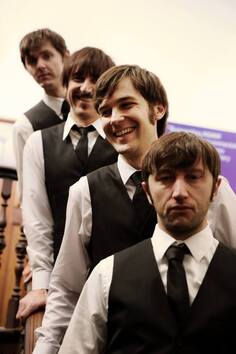 A few years ago, when I was a broke writer out of film school with no idea of how to make a go of this career, Dan Nixon approached me with an opportunity. He was opening a creative writing studio in Fitzroy to run classes for kids and asked if I would be interested in working there. I had no teaching experience whatsoever. But I also had no money. This job, I reasoned, was at least writing adjacent. So, acting a lot more confident than I felt, I said yes. I remember meeting up with Dan before the first class and him asking me what I was planning to do with the students. I hadn’t planned anything. I went in with no idea of what I was doing and even less an idea of how to talk to children. That was late 2016. Two students, one day a week. Quickly, that changed. The weeks filled with multiple classes. School holidays were packed with sold-out workshops. More and more teachers joined. I met brilliant people and made lifelong friends. I was part of a booming community of writers and couldn’t be happier about it. But despite my initial reservations, what made it special was the students. Some were immediately, obviously brilliant. Others were quiet achievers who found their passion and their voice more slowly but grew to be formidable writers. Some stayed briefly, others were there from almost the start and are still there now, kids who I’ve seen grow into teenagers and adults. When I signed with HarperCollins in 2019, I was faced with the question of how involved I could realistically stay at the studio. Which I basically dismissed. Things would be fine. And they were, at least until I started having to travel interstate for events and writer’s rooms more frequently. Until it became clear that my suddenly erratic schedule was not fair on the students. So a compromise was reached. I would pull back from most of my classes and focus instead on running the Monday Masterclass, a more involved course for the older kids. Which, luckily, included most of the students I’d grown closest with over the years. I had big plans for Masterclass, which were largely derailed by the pandemic moving us mostly online for the past two years. Still, we forged ahead, running practice writer’s rooms, hearing from high-profile guests, and working on longer, more ambitious stories, many of which blew me away. Being on Zoom frustrated me, but intermittently we returned to in-person classes and in those times running Masterclass was a highlight of my week. A chance to be reminded over and over of everything I love about writing by seeing it reflected back at me by a room full of passionate, imaginative young artists. But elsewhere, commitments upon commitments kept piling up. I tried to bring my best to my weekly classes, but all too often my mind was elsewhere, leaving my long-suffering co-teacher Anna Morgan to (expertly) pick up the slack. Finally, I had to make a hard decision. Could I, in good conscience, keep running these classes even as outside pressures increasingly drew my attention elsewhere? In the end, staying would only be selfish. So I made a call. And last night, doing my best to stay composed, I ran my last Masterclass. After five years, my last class at Melbourne Young Writer’s Studio. I don’t think it fully hit me until I arrived in Fitzroy half an hour early. I wandered the streets and as I did, reflected back over the past five years. I got to class barely holding it together. I did, in the end, but that didn’t make it any easier to say my goodbyes to the students I have been so, so fortunate to get to know over the past few years. That I have got to be even a small part of their writing lives is a privilege beyond anything I ever could have asked for or expected. There have been too many names over the years to give all of them the shout-out they deserve. But to everyone who has been a part of my time at MYWS, students and staff both, thank you. It’s meant the world. And in a few years’ time when I’m broke in the gutters and the kids I taught are running TV shows and writing bestsellers, I’ll be sure to hit them all up for a job.
1 Comment
 In 2015, I co-directed my play We Can Work It Out, a one act comedy about the Beatles getting drunk and feuding. I was and remain proud of the show – it probably counted as Bitten By Productions’ first real success after a string of ambitious but uneven dramas. We Can Work It Out knew what it was; a fast, fleet comedy with something to say, and while it was in no way reinventing the wheel, it worked, becoming at the time our biggest hit. Deciding to bring it back in 2018 was a no-brainer. This time around I handed directing over to Greg Caine, a brilliant actor and one of my best friends. But early on I had reservations about Greg’s take on the material. We Can Work It Out had earned huge laughs from the Beatles acting like petulant children, something I had played up in my take, but Greg was going for something more real. The most absurd lines were played straight. The characters were taken seriously. I pulled Greg up on this, worried that the play was losing what made it good. Greg, however, was firm in his conviction that the characters couldn’t be in on the joke. He believed that the story would be made both funnier and more authentic by not treating it as a comedy. He was, of course, right. The 2018 version was an unqualified hit, not only holding its own in a competitive Fringe Festival but excelling. Shows were packed out, reviews were raves and audiences came back for more. Beyond any of that, though, it was obvious that the show was head and shoulders above its previous incarnation, to the point where my feelings about the 2015 version became a little more mixed. How could I have missed the obvious? I think there’s often an insecurity in young creatives that the point or tone you’re going for won’t be understood by your audience, which in turn leads to constantly signposting everything you’re trying to achieve. In some ways this was my unconscious thinking with the 2015 WCWIO – I wanted people to laugh, and so I pushed for everything to be heightened just in case the audience missed how they were supposed to react. Greg, for his part, was far more confident in my writing than I was. Make of that what you will. Which brings me to Where The End Began, my new novel which is a reworking of Windmills, the story I’ve been obsessing over now for almost thirteen years. The fact that it is finally going to be published is still surreal to me, but it wouldn’t be published at all if I hadn’t approached it in a vastly different way to how I did previous versions. While there were many different edits and adaptations of the story over the years, since 2009 this is the fourth top-to-bottom rewrite and the first that has managed to get over the line with publishers. So what changed? Several things. Both the inciting incident and climax are now different to the original version. But more fundamentally than that, I think the biggest shift is in how I approached the story, and that comes back to what I learned from Greg on the 2018 We Can Work It Out. At the risk of sounding pretentious, I always saw the earlier versions of Windmills as a kind of modern Macbeth; the story of an ambitious person who sells his soul to get the thing he most wants and, in the process, wreaks untold destruction on everyone that matters to him. Earlier drafts started with a high school mistake and continued through the years, exploring the wide-ranging ways a single bad choice affected many lives. And to really amp up the gravity and pathos of the situation, I always wrote the characters in a heightened way more in line with classical, Byronic or Shakespearean conceptions of people than anyone real. Characters were by turns tortured, poetic or extremely Machiavellian. All of them behaved in accordance with the ideas of the text. None of them behaved quite like human beings. It was a version of Windmills I sent to my now agent Tara prior to The Hunted, and I distinctly remember her suggesting that at times the characters came off as more ‘cinematic cool’ than actual teenagers. At the time I didn’t take that on board. Because, in retrospect, I needed years away from the story to let myself accept that truth. In writing the new version, I eschewed that. I went to great lengths to re-evaluate characters I had previously just treated as one-note bad or good guys and instead try to work out how they were flawed and human and vulnerable. I took my cues from our central rule working on last year’s lockdown web-series The Pact – that this was a story without villains. Which isn’t to say that the characters don’t do terrible, destructive, objectionable things, but rather that said characters are always, first and foremost, human. That their actions and reactions always feel real and are motivated not by the lofty preoccupations of the story or its author, but by what they feel is the right thing to do. One of the first people I sent the finished manuscript to was April Newton, who published the Boone Shepard books and has read, over the years, every version of Windmills I ever wrote. While she probably wouldn’t admit it, April has always been a little sceptical of Windmills – it’s telling that in launching her own publishing house, it was Boone, another high school idea of mine, that she decided to commit to. Consequently, I knew April would be honest with me and I knew that I would need her evaluation before being completely sure that this new and hopefully final version would work. Very quickly, April caught on to the difference. That the characters had gone from archetypical and quasi-mythic to grounded without losing what it was that made them compelling to begin with. That, in fact, bringing them back to earth had made those interesting aspects of them more so. Their new relatability made their often-terrible choices all the more powerful. When I admitted to April that in the past I might have had a somewhat pretentious conception of how Leo, Lucy, Ed and the rest should be perceived, her reaction was a knowing but succinct ‘ha.’ Because she had effectively been telling me the same thing for a decade. But I wonder now if I ever could have realised it without Greg and We Can Work It Out. Without the confidence of an external director looking at my story, saying ‘I truly think that these ideas work better in a grounded way’ and then proving it. For a long time, with Windmills, I was too close to it to accept what I needed to accept. Which is why, no matter what anyone says, writing is a collaborative vocation. Without the perspectives of those close to us, we would keep spitting out versions of a story that don’t work without ever realising the one that does is staring us in the face. |
BLOG
Writing words about writing words. Archives
May 2024
Categories |
 RSS Feed
RSS Feed
